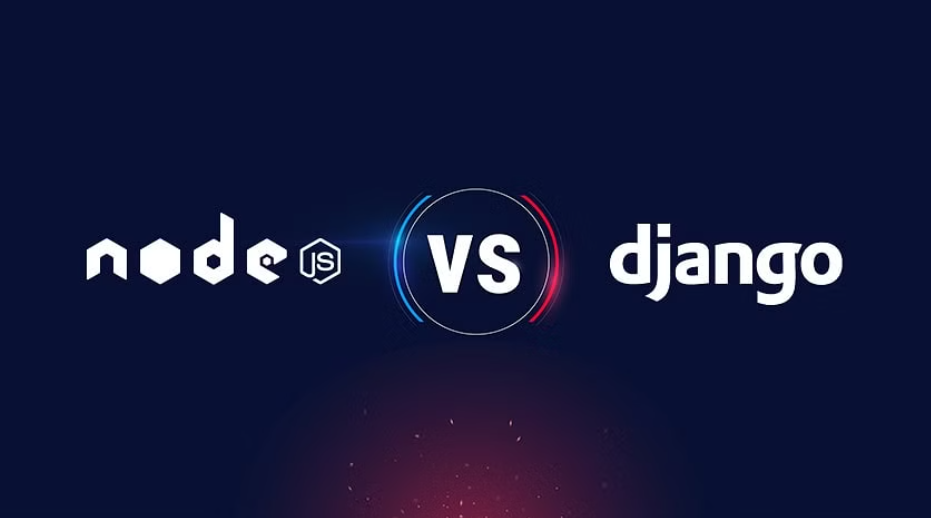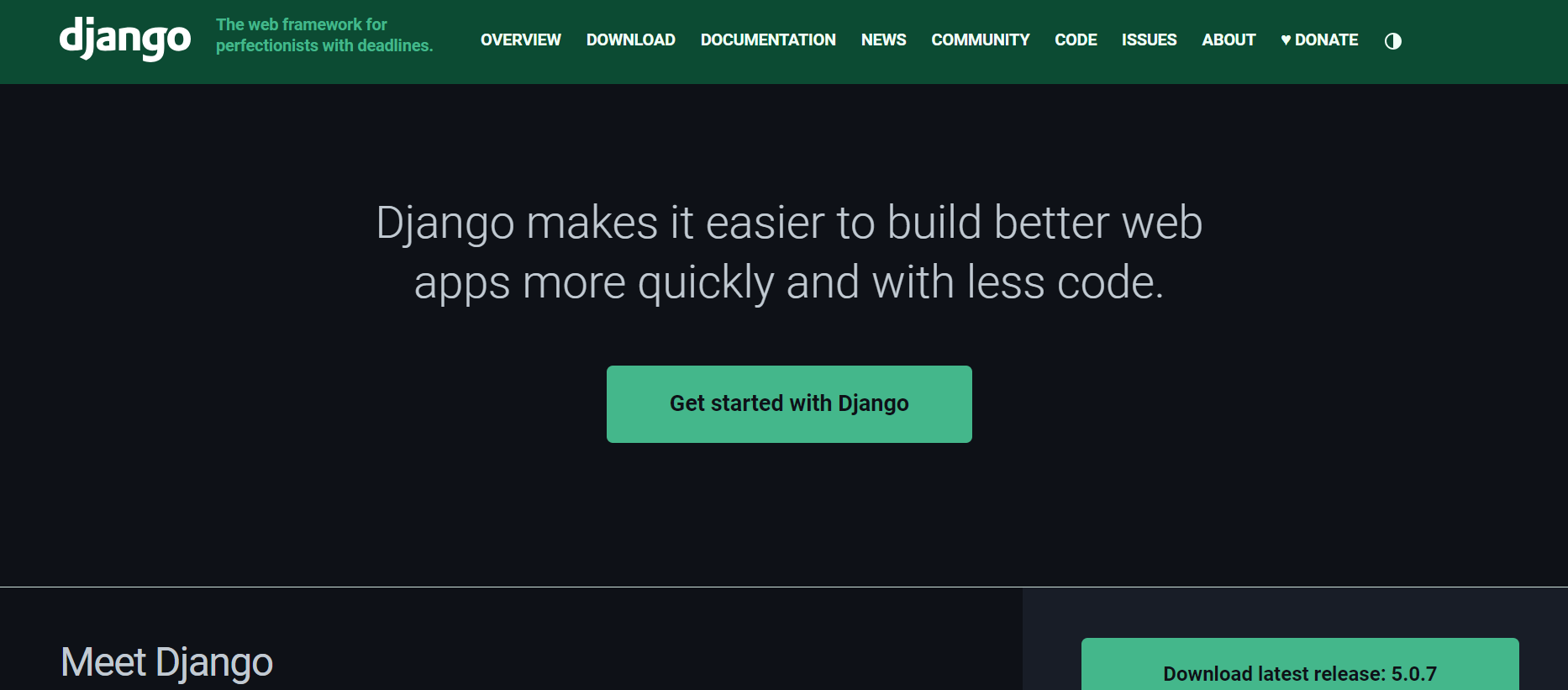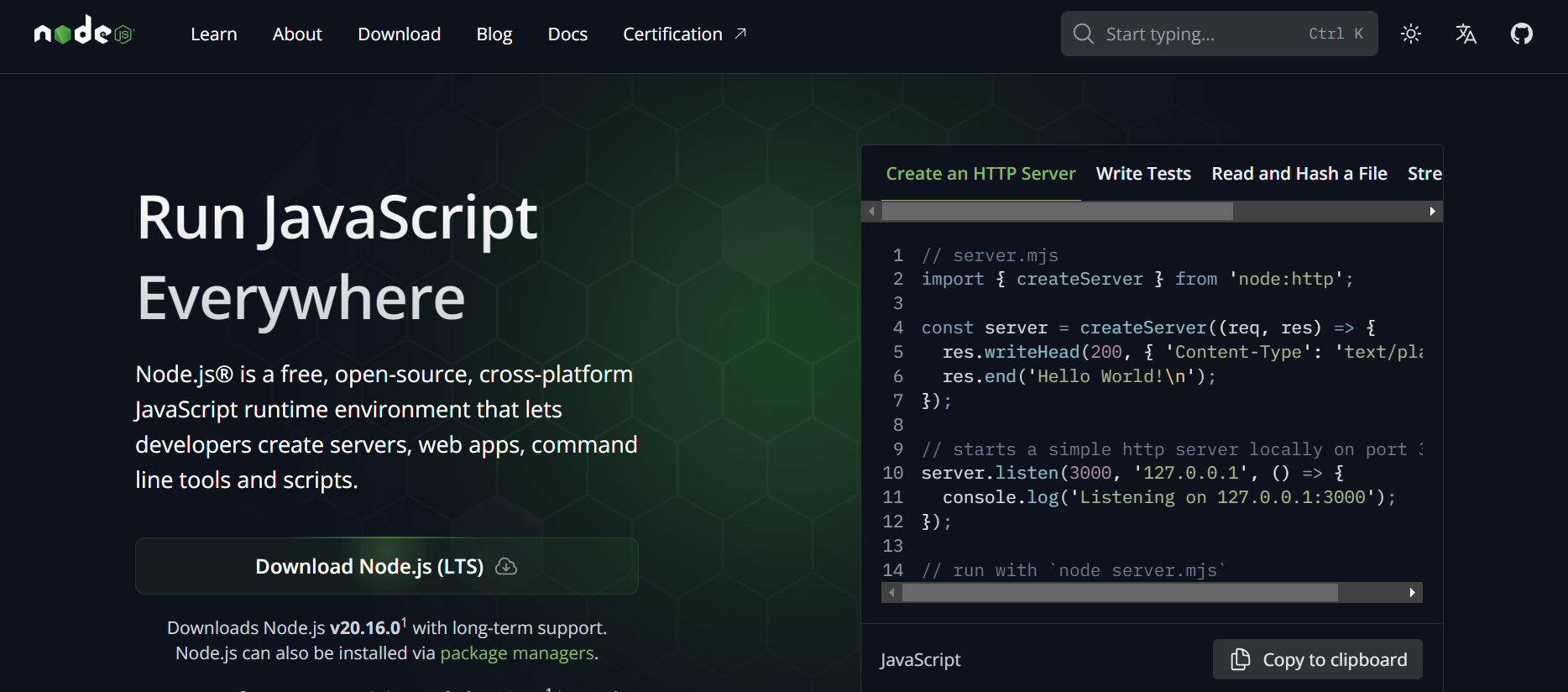Django vs. Node.js: Which is Best for Web Development?

If you're developing an app or starting a website, there's one decision you will be faced with at the very beginning. Which backend framework to use? Your backend framework determines your application's ability to handle key factors like increasing user traffic, data volumes, and feature complexity over time. So choosing the right framework from the start will dictate how well your website or app can handle growth.
Two of the most popular options are Django and Node.js. They are both well-liked by developers, and each framework has advantages and distinct attributes, making it a bit tough to decide between them. Let's see if we can clarify things by breaking down what each tool is best at.

Our first option, Django, is a simple yet highly effective tool for developing non-complex websites written in Python. Node.js, on the other hand, is written with JavaScript, making it a speedy and dynamic option for sites that require a web developer or extensive work with the server side.
No matter how much guidance you've gotten from your development team or online sources, participating in the showdown between Django vs. Node.js can be intimidating. Whether you're a start-up or looking to scale up, the more you know about these frameworks, the more informed your decision-making will be. Let's dive into the performance differences, ability to handle web traffic, and scalability options of both Node.js and Django to see which best fits your project.
Introduction to Django
Django is a high-level Python web framework. It aims to help app developers create web apps in less time, making them more cost-efficient. Django is designed with a "batteries included" philosophy. This means that it has many built-in features.

Django also has an admin panel and a powerful ORM Object-Relational Mapping system. Security and scalability are the two issues Django is primarily concerned with. That is why it is often used in projects where the structure is strong and the development moves at a rapid pace.
Introduction to Node.js
Node.js is a JavaScript runtime environment tool that was created using the V8 engine of Chrome to run JavaScript for front-end and back-end development. The non-blocking I/O mechanism used by Node.js is effective and lightweight. Its use is widespread, but primarily kicks in when building scalable and real-time applications, such as chat applications and online games.

Django and Node.js are both web application development frameworks, but they approach the task in fundamentally different ways. While they share the common goal of enabling the creation of web applications, Django is more of a one-size-fits-all framework with many tools included by default. Node.js is much more flexible—developers can bring their own third-party libraries and tools. This may lead to greater customization of the proposed solution, though it might be at the expense of the setup and configuration.
To sum up, Django is a more relevant tool if the project needs a structured approach with some built-in features, while Node.js is best used when speed and flexibility are required. These key differences can help you decide which framework is best for your project.
Performance and Scalability of Django and Node.js
When it comes to the performance of Django vs Node.js, each have their advantages and limitations for web development purposes, due to various factors that we will explain here.
Django Performance
Django is built on Python, and it is known for its readability and ease of use. However, since Python is generally slower than JavaScript, Django may not perform as well as Node.js for CPU-intensive tasks. Still, Django is optimized to handle web requests efficiently. It uses a multi-threaded approach, allowing it to manage several requests simultaneously. This makes it suitable for web traffic applications requiring complex data handling and processing.
Django also benefits from its built-in caching mechanisms. Django developers can quickly implement caching to speed up response times for frequently accessed data. This feature is crucial for improving the performance of scalable web apps, too, especially in high-traffic scenarios.
Node.js Performance
High performance is another area in which Node.js shines, especially for I/O-bound applications. Its event-driven, non-blocking architecture enables it to manage numerous connections at once with no overhead. Applications requiring real-time data processing, such as chat programs or online gaming platforms, will particularly benefit from this.
Node.js can be more efficient regarding resource usage, due to its single-threaded and asynchronous nature. It can handle multiple requests without creating new threads for each one, which helps reduce memory consumption. However, Node.js may struggle with CPU-heavy tasks, as it can block the event loop with multiple instances and slow down other operations.
Scalability
Django and Node.js both can scale effectively, but they do so in different ways.
Django: Scaling Django applications, whether you need horizontal scaling or vertical scaling, often involves load balancers and database optimization techniques. Its ORM can be a bottleneck for Django developers if not managed properly, especially with concurrent requests streaming services and large datasets. However, with proper caching and database indexing, Django can handle significant web traffic, mobile applications, and data loads.
Node.js: Node.js is inherently built for scalability. Its event-driven model enables developers to create applications that might handle thousands of concurrent connections. This aside, Node.js is easy to scale horizontally by adding more servers as the load increases and more resources are needed. This has made it popular in a microservices architecture, a Python framework where different parts of an application can be scaled independently.
Overall, Node.js typically delivers superior performance and scalability compared to Django for real-time and I/O-bound applications. However, Django remains a viable and compelling choice for many applications that require complex data processing or a more structured development approach. Understanding the relative performance characteristics and strengths of these frameworks can help developers analyze their project needs more effectively and select the framework best suited to the specific requirements at hand.
Developer Experience and Learning Curve
Let's explore the learning curve for both frameworks and the skill level needed to work with each.
Django
The Django framework is renowned for being straightforward and user-friendly. It adheres to the "batteries-included" idea, offering excellent libraries and pre-built functionality to assist developers in getting started on web projects rapidly. An admin panel, an ORM, an authentication system, and more are included with Django right out of the box. As a result, installing third-party packages for fundamental features is less necessary.
The framework follows the "Django way," meaning using clear conventions and best practices especially created for Django users. This can make it easier for beginners to learn and understand how to structure their projects. Django's comprehensive documentation and strong community support are also significant advantages. If you encounter any issues, there are plenty of resources and forums to help you.
Another advantage is the built-in admin interface and panel. It allows developers to manage application data without needing to build a separate admin interface themselves. This feature saves time and effort, especially in the early stages of development.
Django has a steeper learning curve for those new to Python or web development. Understanding its conventions and best practices may take some time. But once developers get the hang of it, they often find Django a robust and enjoyable framework.
Node.js
A lighter and more adaptable method is provided by Node.js. Compared to Django, it lacks some of the built-in capabilities that allow you to customize your tools and libraries. Although this flexibility gives developers the freedom to design their apps as they see fit, it also results in a more challenging learning curve.
Several parts of the web application can be controlled with Node.js, including user authentication, database interactions, and routing. Beginners may find this difficult to grasp at first, but it also offers a deeper understanding of how various components of the tech stack of a web application interact.
The Node.js ecosystem is quite vast, with several tools and frameworks like Express.js that may expedite development. Node.js is also supported by sizable community support. There are several resources available to developers, including tutorials, forums, and more. The vast npm (Node Package Manager) ecosystem has thousands of packages that can enhance functionality. However, new developers may find the abundance of alternatives intimidating when deciding which tools to use.
In Summary, Django provides a more organized and approachable environment for beginners. More control and flexibility are offered by Node.js, which appeals to developers who want to tailor their stack. Your level of experience and personal preference for structure over flexibility will determine which option you choose.
Ecosystem and Integration Capabilities
Let's explore the ecosystem and integration capabilities of Django vs node.js.
Django
Django has a strong, developed ecosystem. It has been around for almost 20 years (and yes, it was named after guitar great Django Reinhardt) therefore there are a lot of third-party apps, libraries, and plugins available. These resources offer pre-built solutions for common tasks, which can greatly accelerate development. For instance, building APIs is made simpler by the Django Rest Framework (DRF), and Celery is a well-liked option for managing asynchronous processing and background jobs.
Thanks to its integrated ORM, which supports many databases like PostgreSQL, MySQL, and SQLite, Django interacts nicely with a wide range of relational databases. Because of this flexibility, developers can select the database that best meets their requirements. Furthermore, Django is readily linked with front-end frameworks such as Angular or React, making it possible to create cutting-edge, dynamic web applications.
For deployment, Django integrates easily with AWS, DigitalOcean, and Heroku. Because the framework is compatible with these services, scaling and deploying your application will be a simple and effective learning process.
Node.js
The Node.js community is growing rapidly and is quite active. The Node Package Manager's (NPM) libraries and modules can help you extend the functionality of your application. You can discover modules for practically every capability you require, from web frameworks like Express.js to database connectors, thanks to the more than a million packages that are available.
Both conventional SQL databases and NoSQL databases, such as MongoDB, interact seamlessly with Node.js. Because of its non-blocking I/O architecture, it works especially well with real-time data processing applications, such as chat and live streaming services.
Node.js works well with JavaScript frameworks like React, Vue, and Angular for front-end integration. With this synergy, developing in the same language on both the server and client sides is possible throughout the entire stack.
Node.js is also quite good at interacting with different cloud platforms and services. Because of its excellent compatibility with AWS, Google Cloud, and Azure, deploying and scaling apps is simple. The extensive ecosystem of DevOps services and tools designed specifically for Node.js further enhances its integration capabilities.
In summary, both Django and Node.js offer vital ecosystems and integration compatibilities. Django provides a more mature and structured environment with many plugins and libraries. With a large and quickly growing community, Node.js provides flexibility and a large selection of modules for a variety of use scenarios. Your particular project requirements and preferences for ecosystem features and integrations will determine which option is best for you.
Use Cases and Suitability
When should you use Django, and when is Node.js a better fit?
Django: Ideal for Data-Driven Projects
Django applications are quite rigid, which makes them ideal for creating difficult and large-scale web applications based on the data. Some everyday use cases for Django include:
Content Management Systems (CMS)
Django has a very customizable built-in administration tool, and Django’s Object-Relational Mapper makes it perfect for developing CMSs. They are innovative because they enable you to readily create an environment for your content, users, and roles/permissions.
E-commerce Platforms
With packages like Django Oscar and Saleor, Django is well-suited for developing e-commerce websites. It provides secure payment integrations, product management, and customer data handling.
Educational Platforms
Django's scalability and security make it a good choice for educational platforms that require user authentication, course management, and progress tracking. It can efficiently handle large amounts of data and concurrent users.
Social Networking Sites
Django's ability to manage complex user interactions and relationships and its built-in authentication system make it suitable for developing social networking sites. Its robust security features protect user data.
API Development
Django can be described as quite efficient in terms of creating powerful and scalable backend APIs with the help of the Django REST framework. One API example easily integrates with various front-end frameworks and even mobile applications. There is also API documentation and testing included.
Node.js: A Go-To for Real-Time Applications
Node.js excels in scenarios where rapid response times and efficient handling of concurrent requests are critical, like NoSQL database-based and event-driven systems. It's particularly well-suited for applications that require real-time interactions or need to manage numerous simultaneous connections. However, it's important to clarify a common misconception: Node.js is not an interpreter for client-side code execution in web browsers. Instead, it's a server-side JavaScript runtime environment.
While Node.js can be used in conjunction with frontend development tools and frameworks, its primary role is on the server side, allowing developers to use JavaScript for backend development, so they can build scalable network applications. Some of the use cases of Node in everyday life are as follows:
Real-time Applications
Node.js is exceptional for creating applications such as chat apps, live streaming services, or various collaboration tools. This is because of the nonblocking I/O model, which makes it very fast with extremely low latency.
Single Page Applications (SPA)
Node.js can easily correlate with other frameworks such as Angular, React, and Vue.js to build SPAs. It allows users to transfer data between client and server products and improves the user experience.
Microservices Architecture
Node.js is perfect for microservices because it is a lightweight language that allows for the processing of several procedures at once. It facilitates the building of systems that can grow and evolve by breaking functionalities into small manifestations of self-contained facilities.
IoT Applications
Node.js focuses on an event-driven approach that is applicable to the IoT architecture needed for real-time communication and processing. It can optimize the use of many devices and the flow of information.
Serverless Architectures
Node.js is very compatible with other serverless platforms like AWS Lambda and Azure Functions. Node.js's non-blocking, event-driven architecture allows developers to create high-performance applications that can handle numerous concurrent connections with minimal resource usage, so fewer servers may be needed to handle equivalent loads
Data-Intensive Applications
Node.js is best suited for situations where large volumes of often heavy data are exchanged within a limited amount of time, such as in online gaming applications and money processing systems. This makes it perform well in asynchronous operations and respond well to data processing.
In summary, Django is preferable for projects like CMS, e-shops, and educational platforms because it offers more serious built-in features and a neat, structured program. Node.js excels in data-intensive and microservices-based applications because it is flexible and high-performing. The decision between them depends on the particular project tasks and the type of application being created.
Job Market and Industry Demand
The job market for Django and Node.js developers is strong, with a high demand for skilled professionals in both frameworks. However, the specific job market trends and industry demand differ.
Django: Steady Demand in Certain Sectors
The Stack Overflow Developer Survey 2023 report shows that Django is the fifth most popular web framework. Around 42.65% of developers use it. Django provides tools to reduce development time, making it an ideal choice for rapid development. The development process is quicker due to the language's simplicity and the framework's focus on enabling fast MVP development. Django is more efficient in development time, making it a cost-efficient choice.
Strong Demand for Python Developers
Python remains a popular language, and as more organizations adopt this framework, Django becomes more valuable. Python is actively used in data analysis and machine learning, as well as web platforms, which means that there is a higher demand for using Django to create high-performance web applications.
Enterprise and Startups
Both large enterprises and star startups use Django to build complex applications quickly. Companies like Instagram, Pinterest, and Disqus rely on Django for its reliability and scalability, creating job opportunities across different sectors.
Focus on Backend Development
Django is primarily used for backend development, meaning there's a strong demand for developers who can integrate frontend technologies with Django-based APIs. Knowledge of the Django REST framework is precious for developing RESTful services.
Emphasis on Security
Due to its excellent security measures, Django is widely used in industries that deal with sensitive information like finance and health. This, in return, increases the job demand for developers with special skills in Django security features and measures.
Educational Institutions and Research
Many educational institutions use Django to develop learning management systems and research platforms. This sector creates opportunities for Django developers to work on projects that support education and research initiatives.
Node.js
Node.js is extremely popular when it comes to developing dynamic web apps that are relatively easy to scale.
Growing Popularity in Real-Time Applications
Node.js is increasingly being favored for building real-time applications such as chat apps and live streaming services. Node.js developers are highly in demand in the media, entertainment, and social networking industries.
Expanding Use in Microservices
As more companies adopt microservices architecture, the demand for Node.js developers continues to rise. Node.js excels at creating lightweight, distributed microservices, making it an invaluable tool in a developer's arsenal. Its efficiency in handling concurrent operations and its ability to rapidly process requests make Node.js particularly well-suited for building the small, focused services that characterize microservices architecture.
Integration with JavaScript Ecosystem
Node.js allows developers to write JavaScript for both the front end and the backend of a project. This makes it appealing, particularly to companies who want a shorter time to market for their products. This increases the demand for the full stack developer who is proficient in Node.js.
High Demand in Startups
Startups choose Node.js for its speed and scalability, creating numerous job opportunities for the talented software engineer. Its lightweight nature allows rapid prototyping and iteration, which is crucial in startup environments.
Focus on Asynchronous Programming
Due to its non-blocking I/O model, Node.js is well-suited for carrying out asynchronous operations. Asynchronous programming and event-driven architecture are the most sought-after specializations, due to the emphasis on creating applications with excellent performance.
In summary, Django's popularity is driven by its solid foundation in Python, emphasis on security, and integration with corporate software. Because it can handle microservices, full-stack development, and real-time applications, Node.js is highly sought after. Although there are many career options available in both frameworks, picking one to specialize in may depend on the particular projects and sectors you are interested in.
Security Comparison
SQL injection protection and clickjacking prevention are two of Django's built-in security features. Node.js features package management that makes security maintenance simple; however, it still requires manual security implementation. Django is a safe option for backend development since it defends against security breaches.
Conclusion
Node.js and Django are great technologies that are reliable and versatile. Thus, to choose the most proper framework for your project, consider factors such as compatibility with the ecosystem, security, scalability, and performance. Node.js is often preferable for developing real-time applications and APIs, while Django is famous for rapid development and building data-driven applications.
Elevate Your Web Development with VPSServer
VPSServer's hosting solutions support both the Django and Node.js frameworks. Whether you are building a complex data-driven application with Django or a real-time service with Node.js, our flexible and scalable hosting options are designed to meet your needs. We also offer robust security features and exceptional customer support on our high-performance servers.











